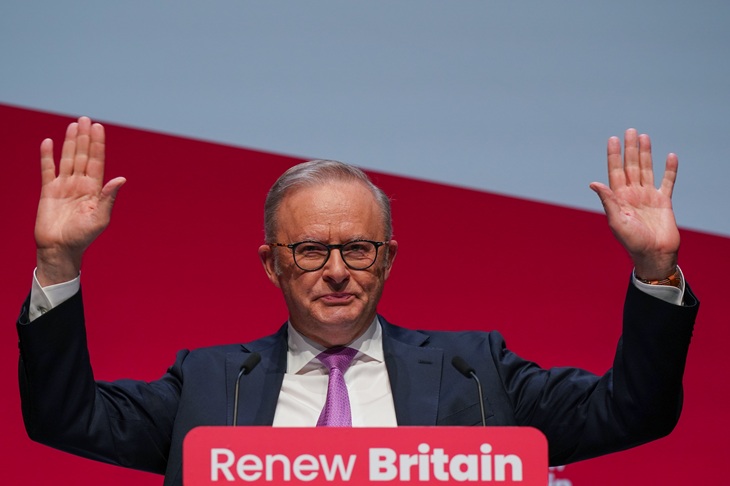
LIVERPOOL, ENGLAND - SEPTEMBER 28: Prime Minister Anthony Albanese, Leader of the Australian Labour Party addresses delegates during the Labour Party conference at ACC Liverpool on September 28, 2025 in Liverpool, England. Labour Conference is being held against a vastly different backdrop to last year when the party had swept to power in a landslide general election victory. A year on and polling shows three quarters of Britons (74-77%) say they have little to no trust in the party on the cost of living, immigration, taxation, managing the economy, representing people like them, or keeping its promises. (Photo by Ian Forsyth/Getty Images)
URGENT UPDATE: UK Prime Minister Keir Starmer and Australian Prime Minister Anthony Albanese are facing intense scrutiny as rising political tensions and public sentiment shift dramatically. During Starmer’s recent speech in London, confusion erupted when he claimed the Australian Labor Party secured a “landslide victory earlier this summer,” despite Albanese recording one of the lowest primary votes in Australian history during the Autumn elections.
Starmer’s remarks come amid a backdrop of escalating protests across the UK, where millions have taken to the streets demanding an end to mass migration and anti-Western policies. The Reform Party, led by Nigel Farage, is gaining traction, presenting a significant challenge for Starmer, who risks losing ground with a public increasingly disillusioned by traditional politics.
As the political landscape shifts, the implications for both leaders are profound. Voter concerns over immigration and national identity are reshaping public discourse, with many blaming existing policies on the perceived failures of the left. The urgency of this moment cannot be overstated: if elections were held today, analysts suggest Starmer could be ousted, potentially paving the way for Farage to ascend to power.
The growing discontent in the UK is mirrored in Australia, where Albanese grapples with similar challenges. Reports indicate that there is a rising fear of populist movements in both countries, prompting leaders to reevaluate their strategies. Albanese’s recent comments about “progressive patriotism” raise eyebrows, as critics question the sincerity behind a call for national pride amidst increasing societal divisions.
In December, Albanese’s government plans to introduce a controversial Online Safety Act that critics argue could stifle free speech and political discourse. The legislation aims to regulate social media platforms more strictly, imposing significant penalties for non-compliance. “This digital barbed wire will be dragged across Australia,” warns an opposition spokesperson, suggesting that these measures could limit public engagement and expression.
Both leaders are now at a crossroads. The success of Farage’s movement signals a potential shift in the political tides, with many citizens calling for a return to traditional values and national coherence. The situation is urgent, and the reactions from Starmer and Albanese will be pivotal in determining their political futures.
As public sentiment increasingly turns against leftist policies, analysts warn that both leaders must address the roots of division instead of merely labeling dissent as “dangerous.” With protests growing louder and public frustration reaching a boiling point, the next steps taken by Starmer and Albanese will be closely watched.
In this charged atmosphere, the question remains: can these leaders transform the narrative and regain public trust, or will they be swept away by the rising tide of populism? The stakes are high, and the developing situation demands immediate attention from both political insiders and the general public.
Stay tuned for further updates as this story unfolds. The implications of these developments could reshape the political landscape in both the UK and Australia.






